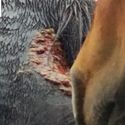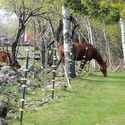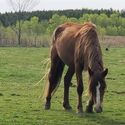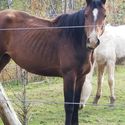Humane society, sheriff's office investigate horse neglect case
July 26, 2019

Angela Bullock
Horses on a farm in rural Wrenshall were so thin earlier this year that their ribs were clearly visible.
A Wrenshall-area farm with 60 or more horses that appeared to be underfed and lacking care is under investigation by the Carlton County sheriff's department and the Animal Humane Society, a non-profit organization that investigates claims of animal abuse and neglect.
No charges have been filed in the case, and Animal Humane Society investigator Amanda Oquist said the farmer who owns the horses has been cooperating with her since she first visited the farm May 21.
Neighbors say they've been reporting issues with animals getting out and being neglected for at least a decade. Angela Bullock - founder and owner of Northstar Equine Rehab and Rescue - has been tracking (and photographing) the horses for two years now, ever since a friend who does donkey rescues first told her about the horses.
"I have so many pictures of extremely emaciated horses, pregnant horses with their bones sticking out, horses with sores and other injuries that have gone untreated, horses tied up with no food or water and carcasses lying around the pasture," Bullock said, showing photos on her cellphone and sharing other photos she took with her camera's longer lens.
Oquist confirmed that the horses were in poor shape when she came in May, with many so thin that their ribs were visible through their coats.
"I am working with [the farmer] to correct the number of horses he has," Oquist told the Pine Knot News Wednesday. "When I was there the first day there were 60 that I counted."
Two months later, however, and they are much healthier, Oquist said. The farmer - who hasn't been charged, so won't be named in this story - has also voluntarily reduced the size of the herd by 21 horses, she said, adding that the farmer plans to sell more horses, but is waiting until fall and the babies can be weaned.
She said the owner had "bad breeding practices going on" and hadn't gotten rid of a lot of the young stock, explaining that typically someone will raise a foal until it's weaned, then sells the animal. He'd kept too many young stallions as well.
An angry Bullock said the farmer had simply been keeping all of the horses, and allowing them to breed at will with inbreeding likely as a result. She showed a photo of a mare with a huge red oozing sore on its buttocks.
"It was basically being humped to death," she said.
Bullock and the neighbors agree that the horses look better now. It is summer, and they've seen the farmer put out hay sometimes. But they say they've seen it before, and worry that the neglect will begin again when the humane society and law enforcement turn their attention elsewhere.
Oquist - who started her investigator job last August - said her primary goal, and the goal of the Animal Humane Society, is to investigate animal welfare complaints and to educate people. They work with local law enforcement, as they are doing in this case, if there is a possibility of criminal charges of neglect or animal abuse. With the help of local law enforcement and the courts, they can seize animals as a last resort.
"We deal with everything from hamsters up to horses, cattle, goats and sheep," Oquist said. "Anything animal-related, where there's a possible welfare criminal issue, we investigate."
Carlton County sheriff Kelly Lake confirmed that her office has been working with the Animal Humane Society, and to date there has been no legal standing for them to seize any animals. They will give the investigation to the county attorney's office to decide if criminal charges are warranted when it is complete, Lake said.
"People wanted us to seize all the animals and throw [the owner] in jail for life," the sheriff said. "That isn't how things work. It was addressed as soon as we got the complaint and we are working with the humane society. The primary goal to make sure the horses are taken care of. Things don't happen overnight."
The fairly lengthy Minnesota state statute prohibits animal neglect, harm, abuse, torture, cruelty, overload and depriving of necessary food, water or shelter, among other things. It also addressed proper disposal of animal carcasses.
Oquist said the Wrenshall case is one of about 10 open cases she is currently working on, and she drives up from her home office in Finlayson about every two weeks to check the herd.
"This is by far the most in-depth case I have at this point," she said. "Every now and then we get these big horse cases. But he's been very cooperative. He calls me back. And I'm making sure no horses are falling behind in development, and we're moving in the right direction."
Oquist pointed out that the photos taken in May came after a tough winter.
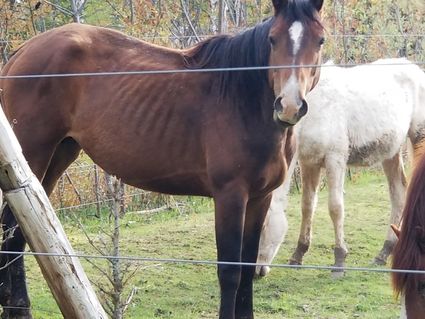
Angela Bullock
Horses on a farm in rural Wrenshall were so thin earlier this year that their ribs were clearly visible.
"With all the snow and super cold we had, it was a tough winter for horses, not just his horses," she said. "Things have changed in the last two months ... since many of those photos were taken. Things have moved in a positive direction. I'm not afraid to seize horses if I need to, but I'm not seeing that on this farm at this time," she said, stressing the last three words.
The neighbors and other concerned citizens are still worried for the horses, their property, for the safety of drivers and others when the horses get out, which they do. Bullock says she will continue to monitor the horses from outside his property.
More than a thousand people have signed an online petition at change.org, asking for "Justice for Neglected Minnesota Horses."


